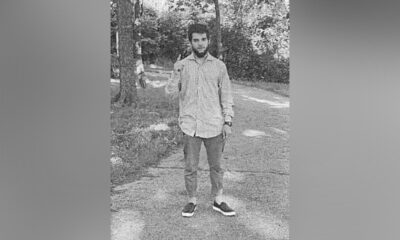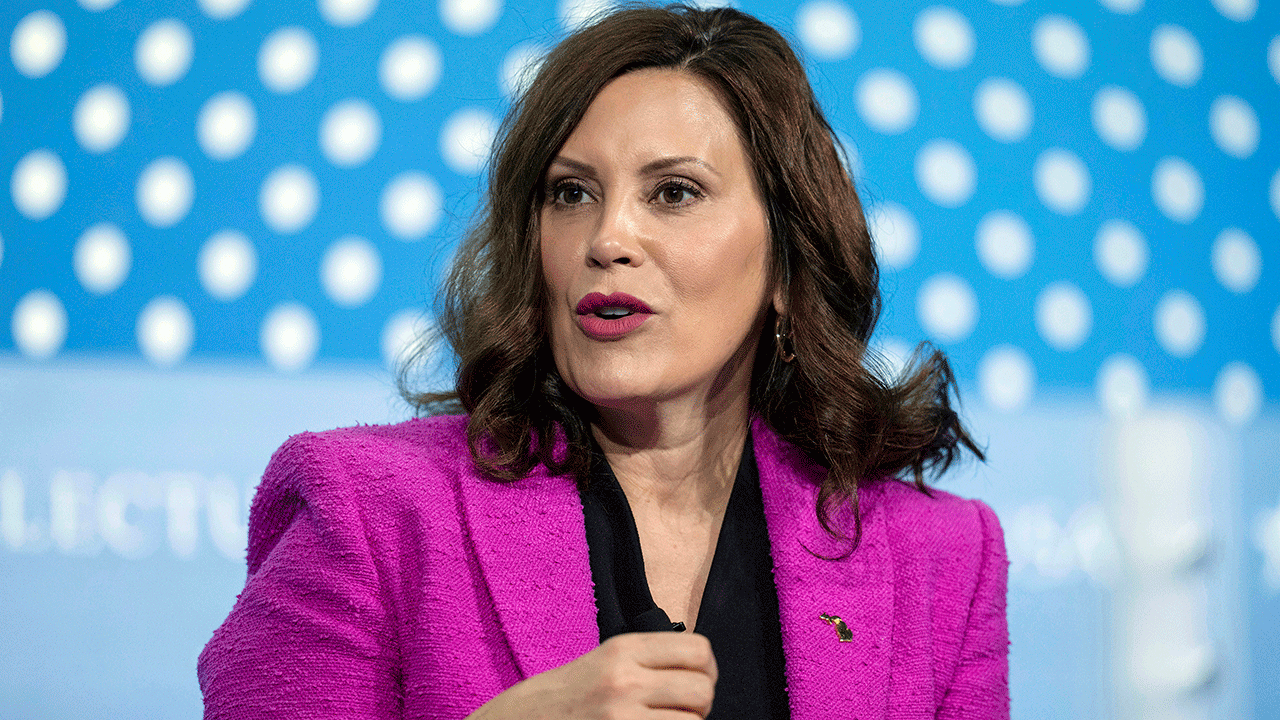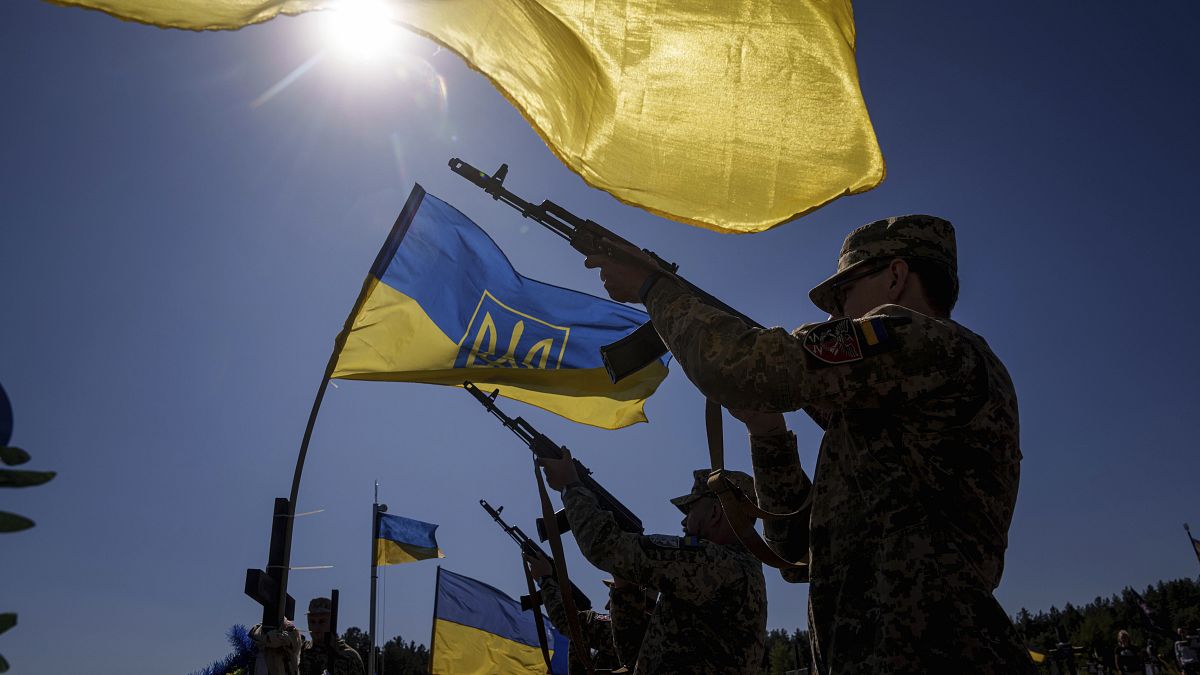Iowa suffered a dispiriting 12-10 loss to Minnesota on Saturday, losing possession of Floyd of Rosedale for the first time in eight years and seeing Gopher celebrations on the Kinnick Stadium turf for the first time in 24 years. So what are some of the biggest takeaways from that defeat, as Iowa heads into a much-needed bye week?
Iowa
Go Iowa Awesome – Five Takeaways: Minnesota 12, Iowa 10
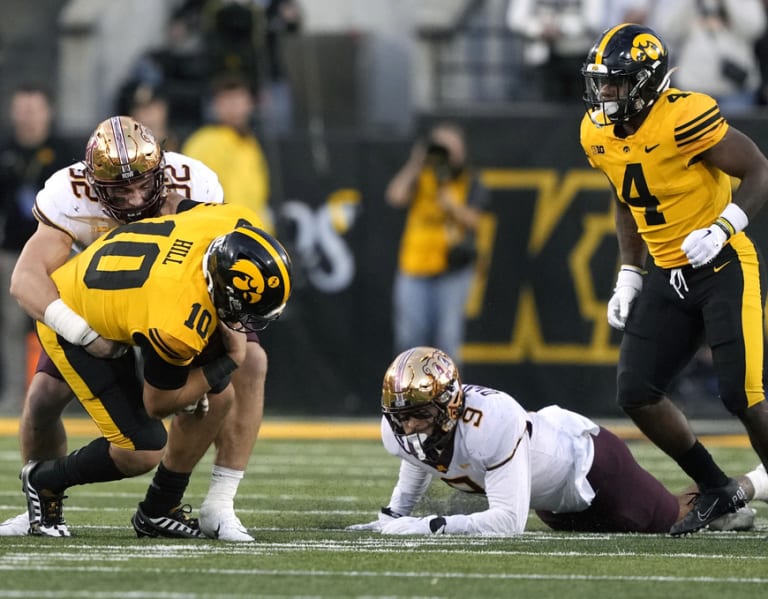
THE RETURN THAT WASN’T
I don’t have anything new to add about Cooper DeJean’s disallowed punt return touchdown that wasn’t already said on the new episode of the HawkCast podcast or by Adam in this post. But obviously that play has to be acknowledged; it was the biggest play of the game — and the season — for Iowa.
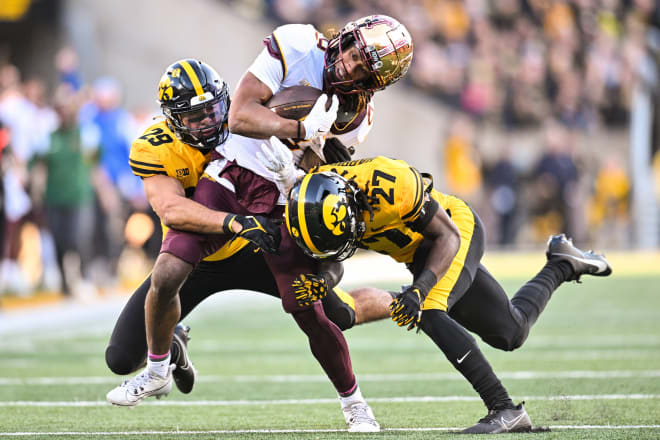
THE DEFENSE DID ENOUGH TO WIN
It seems obvious, but it’s worth reiterating: the defense did enough to enable Iowa to win this game. In fact, this was one of Iowa’s best efforts of the seasons, statistically.
Iowa held Minnesota to 239 total yards (tied with the Western Michigan game for the fewest allowed) and just 3.4 yards per play (the fewest Iowa has allowed this season). 12 points allowed, 239 yards, 3.4 yards per play — these ought to be winning numbers for the Iowa defense.
Two of Iowa’s three turnovers occurred in Hawkeye territory, yet led to just three points for Minnesota. Minnesota took over on the Iowa 32 after the first fumble recovery, but gained only seven yards in three plays and missed the ensuing 43-yard field goal.
The Hawkeye defense’s performance was arguably more impressive after Iowa’s second fumble. The Gophers took over on the Iowa 11 after the second fumble, and the defense allowed just one yard — its reward an easy field goal attempt for Minnesota, who converted the 28-yard try.
This is the third game that Iowa has lost since the start of the 2022 season despite allowing 12 points or fewer (joining the 9-6 loss to Illinois and the 10-7 loss to Iowa State from last season).
Not to belabor the obvious, but teams should not lose a game in which the defense allows fewer than 13 points — but that becomes a significant risk when the offense fails so regularly.
Don’t miss out on any of our exclusive football, basketball, and recruiting coverage. Sign up with Go Iowa Awesome here.
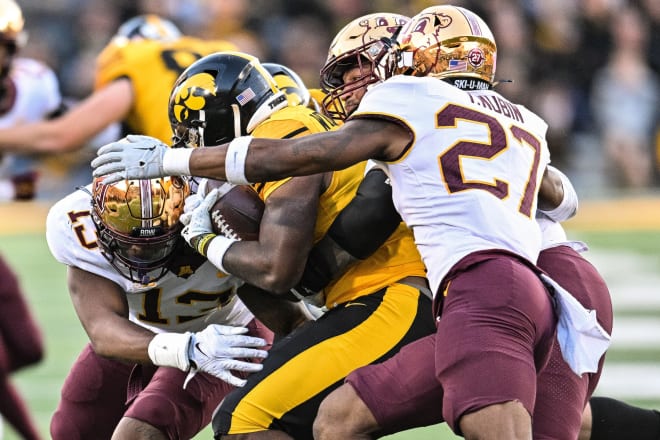
RUNNING GAME REGRESSION
All the gains made by the Iowa running game against Purdue (208 yards by running backs, 6.9 ypc, 1 touchdown) and Wisconsin (209 yards by running backs, 5.0 ypc, 1 touchdown) disappeared against Minnesota. Kaleb Johnson ran for 18 yards on six carries. Leshon Williams ran for 13 yards on 11 carries. (Nine of his carries went for 22 yards, but he also had two carries that lost a total of nine yards.)
Iowa’s longest run of the game was a 7-yard gain by Deacon Hill on a QB sneak in the fourth quarter.
The only comparable performance this season for Iowa’s running game came against Penn State, in which Iowa running backs were held to 27 yards on 12 carries. Some notable caveats apply to that comparison, though — against PSU, the Hawkeyes were relying on a true freshman to help shoulder the load (Kamari Moulton had six carries for 19 yards). They were also facing a strong run defense — PSU currently ranks 4th nationally in rushing yards allowed per game (73.4), as well as 3rd nationally in yards per carry allowed (2.3).
Against Minnesota, Iowa had its top two running backs available and healthy; it didn’t seem to matter, as neither had any success cracking the Gopher defense. That Gopher defense ranks a merely-decent 36th nationally in rushing yards allowed per game (119.7), and 59th in yards per carry allowed (3.9). Minnesota bullied Iowa at the point of attack and smothered Iowa around the line of scrimmage.
The run game has been the only marginally successful aspect of the Iowa offense in 2023; removing it from the equation left Iowa bereft of any way to maintain possession, gain first downs, or score points. Getting the running game back on track must be a top priority for the offense during the upcoming bye week.
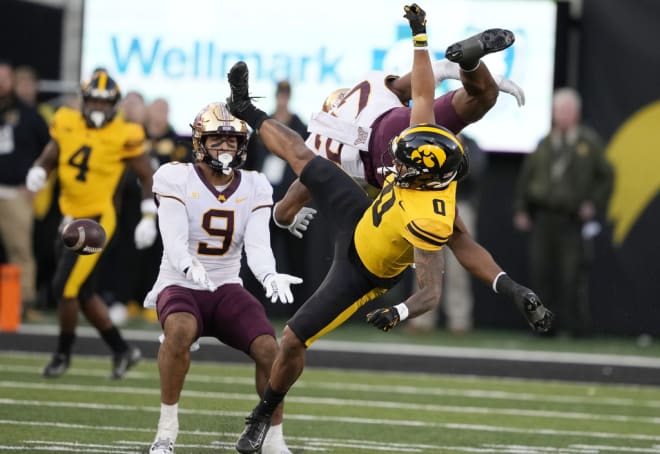
WIDE RECEIVER INVOLVEMENT
The good news: wide receivers caught 9 of Deacon Hill’s 10 completed passes on Saturday. That is a season-high for Iowa, topping the previous season-high of six against Michigan State.
The bad news: Those nine receptions went for just 105 yards. Iowa completed just two passes to receivers in the second half (and just three passes total).
There were a few signs of passing game life on Iowa’s first drive of the game; Hill went 3/6 for 64 yards on that drive, with all of the receptions going to receivers. He opened the game with a sharp 18-yard completion to Diante Vines and connected with Vines again for an impressive 36-yard completion down the sideline. The good vibes in the passing game completely disappeared after that; Hill went 7/22 the rest of the game, with his longest completions being a pair of 11-yard passes to Nico Ragaini and Addison Ostrenga.
Eight games into the season and no Iowa wide receiver has more than 14 receptions (Ragaini) or 125 yards (Vines) — for the entire season. Transfer portal additions Seth Anderson and Kaleb Brown have combined for seven receptions for 94 yards and one touchdown this season.
Luke Lachey has not played in a game since injuring his leg in Week 3 against Western Michigan — and he still ranks second on the team in receiving yards (131) and tied for third in receptions (10). That Lachey has not played in over five games and still ranks second or third in key receiving categories is a damning indictment of the Iowa passing game.
Iowa ranks 131st in passing yards per game (116.5 ypg), ahead of only Navy and Air Force, triple-option teams that have combined to throw the ball 50 times fewer than Iowa this season. Iowa’s completion percentage of 44.1% ranks dead last in the NCAA (133rd) and the Hawkeyes rank second-from-last in yards per attempt (5.0) and QB rating (89.9).
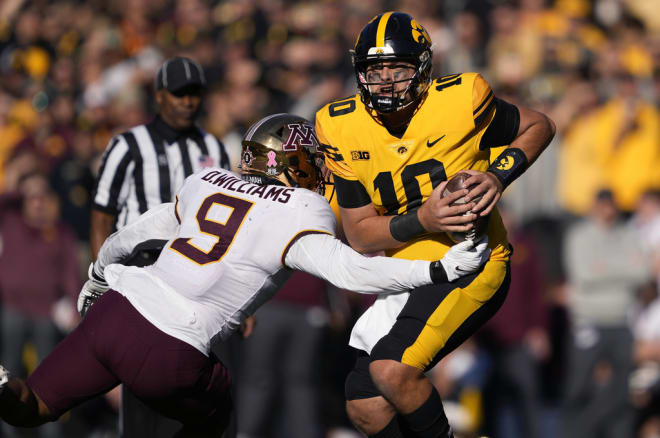
BIG PLAYS EVAPORATED
To the (very) limited extent that Iowa’s offense has been working this season, it’s primarily been through the ability to hit on big plays. Iowa ranks 4th in the Big Ten in plays of 30+ yards (13); if you can’t move the ball consistently, then you need to be able to hit a few chunk plays to cover a lot of yardage in one play.
Iowa had been able to do that just enough in many games this season to either set up scoring plays or score directly on chunk plays (like Leshon Williams’ 82-yard touchdown run against Wisconsin). Against Minnesota, Iowa had two offensive plays longer than 11 yards: an 18-yard completion to Diante Vines on the first play of the game and a 36-yard completion to Vines six plays later. Iowa did indeed score on that drive, settling for a 23-yard Drew Stevens field goal.
The Hawkeyes were unable to hit any plays longer than 11 yards in the remaining 3.5 quarters. That is, unless you want to count the big yardage penalties that Iowa benefited from on their only touchdown drive of the game. Iowa’s second quarter touchdown drive began on the Minnesota 46 after a poor Minnesota punt; only 13 of the 46 yards on that drive were gained via successful offensive plays. The other 33 yards of the drive came via Minnesota penalties, most prominently a 15-yard personal foul facemask penalty and a 15-yard pass interference penalty.
That inability to hit on big plays left Iowa reliant on moving the ball through small, methodical gains… which, again, is not something this offense has proven capable of doing. Predictably, the Hawkeyes were not able to move the ball in that fashion, resulting in punts on 9 of their 13 remaining drives and seven three-and-outs.
Iowa needed so little offense to win this game. One more field goal likely would have been enough to get a victory. At the end of the game, even after the drama from DeJean’s miraculous punt return touchdown (and the officials’ subsequent overturn), Iowa had a first down on their own 46-yard line with 1:32 to play. Per Kirk Ferentz after the game, the Hawkeyes needed to gain just 20 yards to give Drew Stevens a reasonable field goal opportunity. Even that meager amount — 20 yards — was beyond the capability of the Iowa offense.
The disparity between the defense (and special teams) and offense within the Iowa team is as stark as it could possibly be. The Iowa defense and special teams are strong enough to enable Iowa to compete in virtually every game. But the Iowa offense is poor enough to ensure that every game is a potential loss as well.

Iowa
Becht, Hansen lead No. 11 Iowa State over West Virginia 28-16 for first 6-0 start since 1938

Iowa State quarterback Rocco Becht believes the Cyclones have yet to hit their peak during their best start in 86 years.
Carson Hansen rushed for three scores, Becht threw a touchdown pass and No. 11 Iowa State beat West Virginia 28-16 on Saturday night.
The Cyclones (6-0, 3-0 Big 12) opened the season with six wins for the first time since 1938.
“I feel like we haven’t even played our best game yet as a whole — special teams, defense, and offense,” Becht said. The goal is “finding ways to get better each and every single week, and our mindset is just 0-0 and trying to win that next game.”
Iowa State forged a first-place tie in the league with BYU and idle Texas Tech.
The Cyclones broke open a close game by scoring two touchdowns after intercepting West Virginia’s Garrett Greene in the second half.
Becht found Eli Green on passes of 12 and 34 yards on consecutive plays to set up the Cyclones at the West Virginia 17. A third-down holding call on West Virginia cornerback Ayden Garnes gave Iowa State first-and-goal at the 3, and Hansen scored on the next play for a 21-10 lead early in the fourth quarter.
Jontez Williams made his third interception of the season on West Virginia’s next drive, and Iowa State took over at the Mountaineers’ 34. Hansen ran for 20 yards on the ensuing drive, capped by his 2-yard scoring run for a 28-10 lead with 4:42 left.
Hansen, a sophomore who also scored on an 11-yard run in the second quarter, finished with 96 rushing yards, one shy of the career high he set last week against Baylor. He ran for a total of 67 yards during an injury-filled freshman season.
“For him to consistently play the way he has the last couple of weeks, it’s awesome to watch,” Becht said.
West Virginia (3-3, 2-1) was held to 148 rushing yards against the league’s top defense after amassing 389 yards on the ground a week ago at Oklahoma State. The Mountaineers were hurt by several high snaps that threw off their timing and runs parallel to the line of scrimmage that lost yardage.
“In the second half, when it was winning time, we didn’t win,” said West Virginia coach Neal Brown. “We struggled to get into a rhythm.”
Becht completed 18 of 26 passes for 265 yards, including a 60-yard scoring toss to Jaylin Noel in blown coverage in the second quarter.
Becht’s father, Anthony, was honored on the field after the first quarter for his induction into the West Virginia Sports Hall of Fame. He played tight end for the Mountaineers from 1996-99 and 11 seasons in the NFL.
“You couldn’t ask for a greater night for his family,” Iowa State coach Matt Campbell said.
Rocco Becht said he wished he could have been there with his dad, “but I had bigger things going on trying to win this game.”
Jahiem White had an 8-yard scoring run and a 10-yard TD catch for West Virginia. Greene finished 18 of 32 for 206 yards.
Iowa State: The Cyclones answered the challenge on both sides of the ball in winning their seventh straight road game. Becht played smart and efficient, and the nation’s sixth-best scoring defense was stout again.
West Virginia: The Mountaineers many too many mistakes at key times and now have lost eight consecutive games to ranked opponents.
Iowa State might have a tough time moving up when the AP poll comes out on Sunday. The Cyclones were tied at No. 11 with Notre Dame, which beat Stanford 49-7.
Iowa State: Hosts UCF on Saturday night.
West Virginia: Hosts No. 18 Kansas State on Saturday night.
___ Get alerts on the latest AP Top 25 poll throughout the season. Sign up here. AP college football: https://apnews.com/hub/ap-top-25-college-football-poll and https://apnews.com/hub/college-football
Iowa
Iowa football isn’t always pretty, but because of Kirk Ferentz, it has punched above its weight class

IOWA CITY, Iowa — In unseasonably warm air and beneath a blueish haze over Kinnick Stadium, Iowa coach Kirk Ferentz took a moment to himself with two minutes left and his team wrapping up a 40-16 win against Washington.
Ferentz stood apart from his team on the sideline with his headset on as his offense huddled during the media timeout. On the video board, his picture appeared. Public address announcer Mark Abbott relayed that Ferentz was about to win his 200th game as Iowa’s head coach, passing Amos Alonzo Stagg for second in Big Ten history. The crowd stood and applauded, and Ferentz acknowledged them with a wave.
GO DEEPER
Iowa coach Kirk Ferentz earns 200th career win as Big Ten coach
Tight end Luke Lachey gave him a hug, as did running back Kaleb Johnson. Backup quarterback Marco Lainez III shook his hand. With 33 seconds left, Ferentz walked to the TigerHawk at midfield, shook hands with Washington counterpart Jedd Fisch and completed an interview with Fox Sports. More subdued than emotional, Ferentz jogged off the playing surface, up the tunnel and into Iowa’s locker room where his players welcomed him with a water bottle shower.
Sunshine and 70-degree days — literally or figuratively — rarely have followed Ferentz into October in his coaching career, so the picturesque autumn setting was abnormal for college football’s longest-tenured coach. However, how Ferentz and the Hawkeyes responded to a 35-7 loss to Ohio State last week went entirely by script.
There are two defining characteristics through the highs and lows of Ferentz’s 26 years at Iowa: One, his players trust him and believe in him. The other truth is, no football coach — thus, no program — responds better to adversity than Ferentz and his Hawkeyes.
Ferentz’s entire career has revolved around continual improvement. And Iowa has gone very far following Ferentz’s ethos.
“He’s the same person every day,” said left tackle Mason Richman, who is in his fifth season. “He brings the same exact energies. You know exactly what to expect from him, no matter what the scoreboard says.”
Iowa rarely recruits five-star players and mostly signs three-star prospects. Only once in his career did Iowa finish in the top 15 in national recruiting, and that was in 2005. The Hawkeyes are a low-offer program because they heavily research character in recruiting. They want high achievers with good grades who were team captains in multiple sports. To Ferentz and his staff, those players invest themselves and improve others.
“I feel like we recruit the type of the right type of guys,” Iowa linebacker Jay Higgins said. “We just don’t have selfish guys in the locker room. So when you have good guys who understand what a team should look like, and then you also have a good leader, it’s easy to stand together. I just think this team, this program, anytime there’s adversity, we only get closer.”
Those types of players are built to handle challenges, and Iowa continues to have the right coach to navigate them through it. The examples in Ferentz’s era abound.
• In 2016, the Hawkeyes gave up 599 yards in a 41-14 massacre at eventual Big Ten champion Penn State. As a three-touchdown home underdog to No. 2 Michigan the following week, Iowa bounced back with a stunning 14-13 upset.
• Sitting at the midpoint of the 2008 season, Iowa was 15-16 over 2 1/2 seasons. Ferentz never wavered, and neither did his team. The Hawkeyes won their final four games to end that season, and then their first nine in 2009. They finished with their highest final ranking (No. 7) since 1960.
• In 2014, Iowa continued a slope of mediocrity by losing all four rivalry trophy games and finishing 7-6. The next year, dubbed “New Kirk,” Ferentz switched practices from afternoon to morning and became much more open in the public. The players responded in 2015 with a spirit of togetherness, leading to a school-record 12 wins. From that year onward, Iowa ranks tied for 10th among power-conference teams in victories.
• Two years ago, Iowa’s offense was among the nation’s worst in every category. After a 7-3 season-opening win against South Dakota State in which the Hawkeyes scored on two safeties and a field goal, linebacker Jack Campbell shot down any question that dealt with division. Campbell’s attitude set the tone for that season and it carried over to 2023, in which Iowa’s offense posted the Big Ten’s worst statistical numbers in nearly 40 years. Yet there was no sniping, let alone dissension. The team eventually claimed the Big Ten West Division crown.
• In 2004, Iowa started 2-2, including a 44-7 loss at Arizona State. Despite losing four scholarship running backs to injury, the Hawkeyes held it together with defense mixed with an occasional highlight-reel play. The Hawkeyes won their final eight games, claimed a share of the Big Ten title and won the Capital One Bowl with a 56-yard touchdown pass on the game’s final play.
That 2004 team was honored Saturday before the second quarter to rousing applause. One of its stars, defensive tackle Jonathan Babineaux, was Iowa’s honorary captain on Saturday. It was a team molded by adversity, and it charted an unconventional path of success. It even took a safety midway through the fourth quarter against Penn State in a 6-4 win. Ferentz gave the eulogy at his father’s funeral in Pittsburgh the day before that game.
Most teams would have crumbled in any of those situations, but Iowa never did.
Why? Ferentz.
“It’s definitely his leadership,” Higgins said. “He truly only cares about the guys in the locker room. When you’ve got a guy like that thinking you’re able to respond, it’s nice. He’s not gonna freak out. Doesn’t matter what the headline is. He’s not gonna come to the meeting room and read off the headlines. He keeps his voice, and we all respond off him. If he’s calm and he knows that we need to respond after a bad game or a tough situation, we’re all going to follow that.”
None of those anecdotes mean Ferentz is perfect. Far from it. Critiques are plentiful about his son, Brian, running his offense for seven years, especially when the final three were so rough. Brian remained in place until university president Barbara Wilson and athletic director Beth Goetz stepped in and dismissed him following the 2023 season. Other complaints about Ferentz’s game-day decision making are fair.
And in 2020, dozens of former players accused the program of racial insensitivity and bias, which was confirmed through an independent investigation. Instead of resisting necessary changes or stepping down, Ferentz opted for a new course. He accepted responsibility and sought counsel from former players, relieved longtime strength coach Chris Doyle and extended a leadership council to include more voices. Many arbitrary rules such as not using X or wearing hoodies in the football complex were vacated. Although some feel the changes didn’t go far enough — while others believed they went too far — there’s no doubt the program has become more welcoming to all players. Its attrition rate is among the lowest in the Big Ten, and it has won the third most games in the Big Ten since that season.
With Ferentz’s guidance, Iowa has punched well above its weight class.
Its recruiting rankings are closer to those of Illinois and Purdue than Michigan and Penn State, yet the Hawkeyes’ results are closer to the latter. Iowa finds ways to win where its peers fall short. It’s not always pretty and perhaps it won’t ever win the ultimate prize. But that Iowa remains anywhere near the College Football Playoff rankings most years is a credit to Ferentz.
“I appreciate him how much this program means to him,” Richman said. “When you get an appreciation like that, you’re less stressed out. With him at the helm, this place has a really special place in my heart and the hearts of many across the entire state.”
(Top photo of Kirk Ferentz: Matthew Holst / Getty Images)
Iowa
What channel is Iowa State vs. West Virginia game tonight (10/12/24)? FREE LIVE STREAM, Time, TV, Channel for college football, Week 7

The No. 11 Iowa State Cyclones, led by quarterback Rocco Becht, face the West Virginia Mountaineers, led by quarterback Garrett Greene on Saturday, Oct. 12, 2024 (10/12/24) at Mountaineer Field at Milan Puskar Stadium in Morgantown, W. Va.
How to watch: Fans can watch the game for free via a trial of DirecTV Stream or fuboTV. You can also watch via a subscription to Sling TV.
Here’s what you need to know:
What: NCAA Football, Week 7
Who: Iowa State vs. West Virginia
When: Saturday, Oct. 12, 2024
Where: Mountaineer Field at Milan Puskar Stadium
Time: 8 p.m. ET
TV: FOX
Live stream: fuboTV (free trial), DirecTV Stream (free trial)
***
Here are the best streaming options for college football this season:
Fubo TV (free trial): fuboTV carries ESPN, FOX, ABC, NBC and CBS.
DirecTV Stream (free trial): DirecTV Stream carries ESPN, FOX, NBC and CBS.
Sling TV ($25 off the first month)– Sling TV carries ESPN, FOX, ABC and NBC.
ESPN+($9.99 a month): ESPN+ carries college football games each weekend for only $9.99 a month. These games are exclusive to the platform.
Peacock TV ($5.99 a month): Peacock will simulstream all of NBC Sports’ college football games airing on the NBC broadcast network this season, including Big Ten Saturday Night. Peacock will also stream Notre Dame home games. Certain games will be streamed exclusively on Peacock this year as well.
Paramount+ (free trial): Paramount Plus will live stream college football games airing on CBS this year.
***
Here’s a preview capsule via the Associated Press:
No. 11 Iowa State (5-0, 2-0 Big 12) at West Virginia (3-2, 2-0), Saturday, 8 p.m. ET (Fox)
BetMGM College Football Odds: Iowa State by 3.
Series record: West Virginia leads 6-5.
WHAT’S AT STAKE?
Iowa State is off to its best start since 1980, and a win would make them 6-0 for the first time since 1938. The Cyclones are looking to extend their road winning streak to seven games. West Virginia is going after its third straight win after a 1-2 start. Iowa State and West Virginia are 2-0 in conference play. One of them will forge a first-place tie with idle Texas Tech.
KEY MATCHUP
Iowa State’s defense vs. West Virginia QB Garrett Greene. Of the dual-threat quarterbacks the Cyclones have faced so far, Greene could be the best. He had runs of 39, 15 and 10 yards against Oklahoma State last week and is averaging 5.4 yards per carry and 59 yards per game. Run defense hasn’t been a strength for the Cyclones, who hope to force Greene to try to beat them through the air. Iowa State has the Big 12’s top defense, allowing just 10 points and 272 yards per game.
PLAYERS TO WATCH
Iowa State: LB Kooper Ebel has led or co-led the team in tackles in three straight games. He made just three tackles in eight games as a freshman last year. He added 15 pounds to get up to 240 on his 6-foot-4 frame and has made at least six stops in all five games. Last week he had eight tackles and a quarterback hurry against Baylor.
West Virginia: RB Jahiem White. The sophomore ran for a season-high 158 yards in the lopsided win at Oklahoma State and the Mountaineers compiled 389 on the ground. White hopes to be back on track after being limited to 94 yards combined against No. 4 Penn State, No. 22 Pittsburgh and Kansas.
FACTS & FIGURES
Anthony Becht, a tight end for the Mountaineers from 1996 to 1999, will be honored during the game for his induction into the West Virginia Sports Hall of Fame. His son, Rocco, is Iowa State’s quarterback. … The Cyclones have won 12 straight when scoring at least 30 points. They’ve scored at least 30 in the last five meetings with WVU. … ISU had nine plays of 20 or more yards against Baylor last week, tied for the most by a Power Four team against a conference opponent this season. … The Cyclones’ defense gets better as the game progresses. They’re allowing an average of 4.0 points and 112 yards in the second halves. … West Virginia will wear all-black uniforms in honor of the state’s coal mining industry.
(The Associated Press contributed to this report)
Thank you for relying on us to provide the journalism you can trust. Please consider supporting us with a subscription.
-

 World1 week ago
World1 week agoUkrainian stronghold Vuhledar falls to Russian offensive after two years of bombardment
-

 Technology1 week ago
Technology1 week agoBeware of fraudsters posing as government officials trying to steal your cash
-
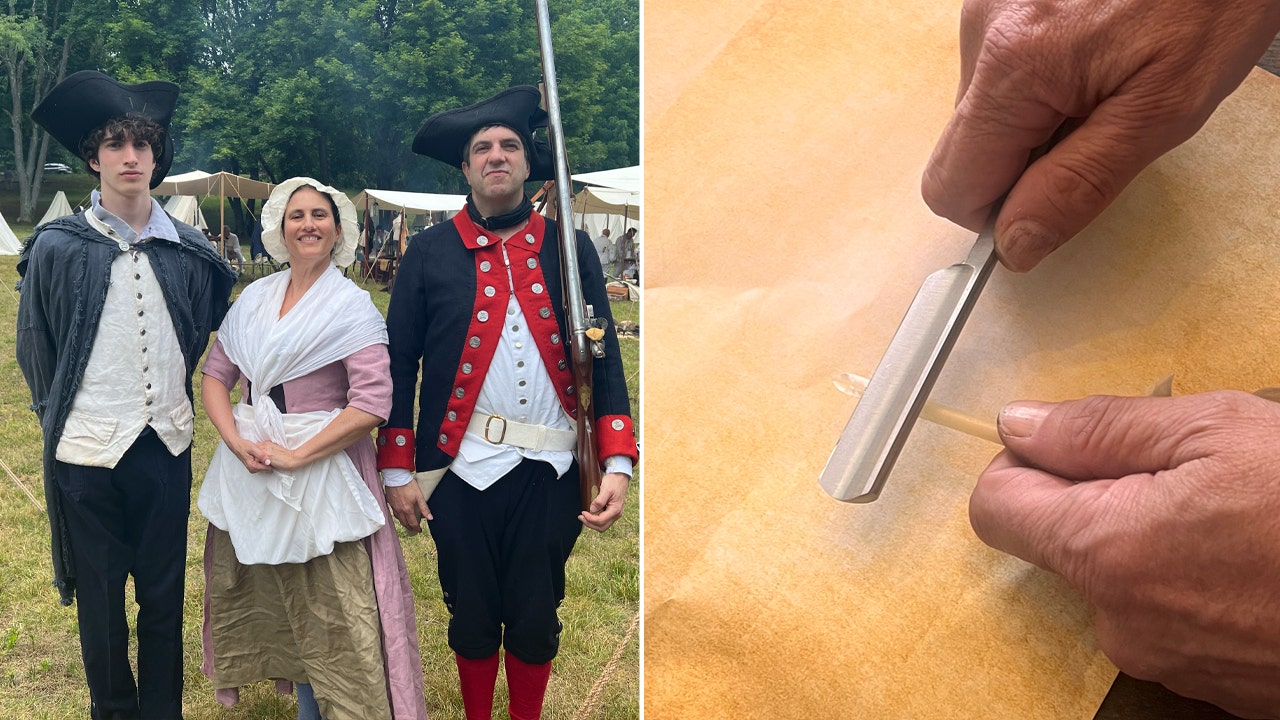
 Health1 week ago
Health1 week agoHealth, happiness and helping others are vital parts of free and responsible society, Founding Fathers taught
-

 Sports1 week ago
Sports1 week agoFreddie Freeman says his ankle sprain is worst injury he's ever tried to play through
-

 News1 week ago
News1 week agoLebanon says 50 medics killed in past three days as Israel extends its bombardment
-
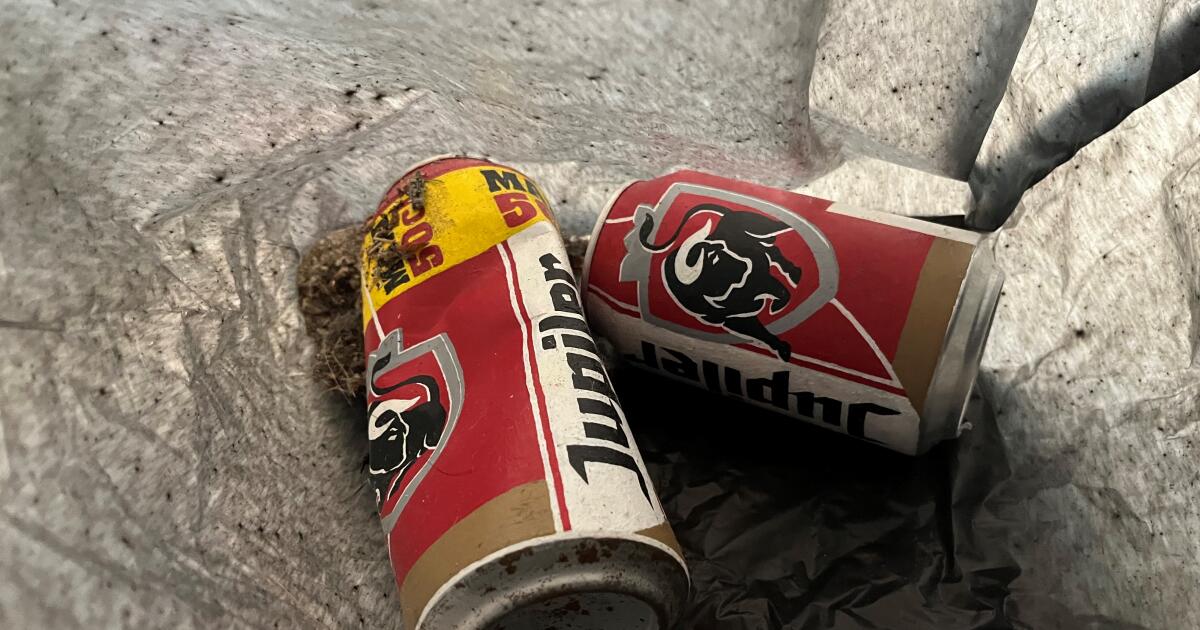
 Entertainment3 days ago
Entertainment3 days agoHold my beer can: Museum says a worker thought unique art installation was trash
-

 Entertainment4 days ago
Entertainment4 days ago'The Office' star Jenna Fischer reveals private breast cancer battle: 'I am cancer free'
-
/cdn.vox-cdn.com/uploads/chorus_asset/file/25673932/462754179_560996103109958_6880455562272353471_n.jpg)
/cdn.vox-cdn.com/uploads/chorus_asset/file/25673932/462754179_560996103109958_6880455562272353471_n.jpg) Technology23 hours ago
Technology23 hours agoMeta suggests AI Northern Lights pics are as good as the real thing




